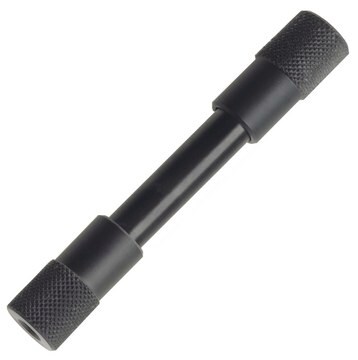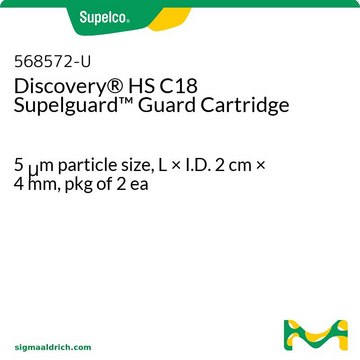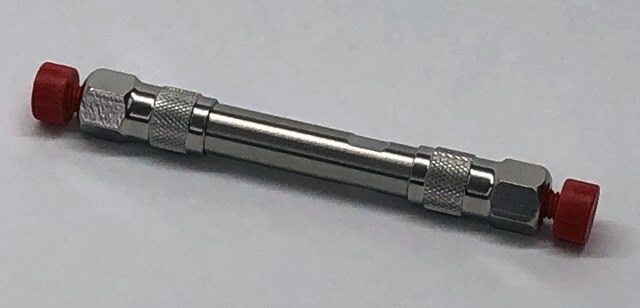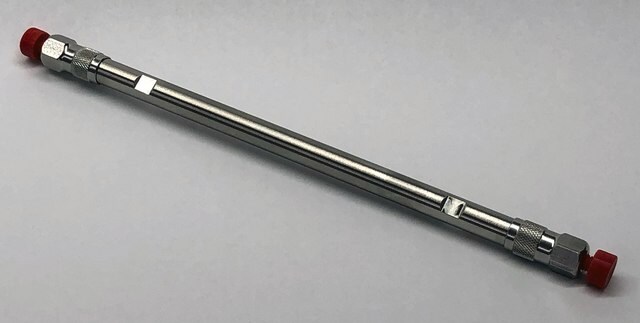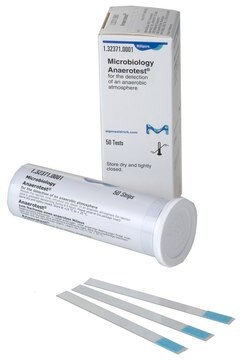1.52352
Chromolith® WP 300 Epoxy (monolithic) HPLC Columns
L × I.D. 25 mm × 2 mm HPLC Column
Sinónimos:
Chromolith® WP 300 Epoxy 25 mm x 2 mm HPLC column
About This Item
Productos recomendados
Nombre del producto
Chromolith® WP 300 Epoxy, L × I.D. 25 mm × 2 mm HPLC column
material
PEEK
Quality Level
product line
Chromolith®
feature
endcapped: no
packaging
pkg of 1 unit
extent of labeling
5.5% Carbon loading
parameter
2-60 °C temp. range
200 bar pressure
technique(s)
HPLC: suitable
column L × I.D.
25 mm × 2 mm
surface area
120 m2/g
matrix
monolithic silica
matrix active group
Epoxy bonding phase
pore size
2 μm macroporosity
30 nm mesoporosity
operating pH range
1.5-7.5
separation technique
affinity
¿Está buscando productos similares? Visita Guía de comparación de productos
General description
Potential applications: attach trypsin to obtain HPLC column-protein digestion reactor; attach protein and measure other protein interaction with the attached one; attach any chiral selector to obtain a chiral column; attach any affinity ligand to obtain custom made affinity column, etc.
Chromolith® WP 300 Epoxy 25-2 columns are made of monolithic silica with a characteristic bimodal pore structure.
Key Benefits:
—Easy to perform immobilization of ligand opens up limitless customization options
—Monolithic format allows for high flow rates at low backpressure, enabling high throughput
—Narrow column I.D. enables improved performance and improved MS-compatibility
Learn more:
Brochure: Race through your Separations on Any System. Chromolith® Monolithic Silica HPLC Columns
Flyer: Create Your Own Column Chemistry - Chromolith® WP 300 Epoxy 2 mm I.D. HPLC Columns
All Supelco HPLC Columns, including monolithic Chromolith® columns, are fully compatible to all HPLC and UHPLC Instruments.
Supelco HPLC Products: The Best Choice for Any LC Instrument
Legal Information
¿No encuentra el producto adecuado?
Pruebe nuestro Herramienta de selección de productos.
Certificados de análisis (COA)
Busque Certificados de análisis (COA) introduciendo el número de lote del producto. Los números de lote se encuentran en la etiqueta del producto después de las palabras «Lot» o «Batch»
¿Ya tiene este producto?
Encuentre la documentación para los productos que ha comprado recientemente en la Biblioteca de documentos.
Nuestro equipo de científicos tiene experiencia en todas las áreas de investigación: Ciencias de la vida, Ciencia de los materiales, Síntesis química, Cromatografía, Analítica y muchas otras.
Póngase en contacto con el Servicio técnico